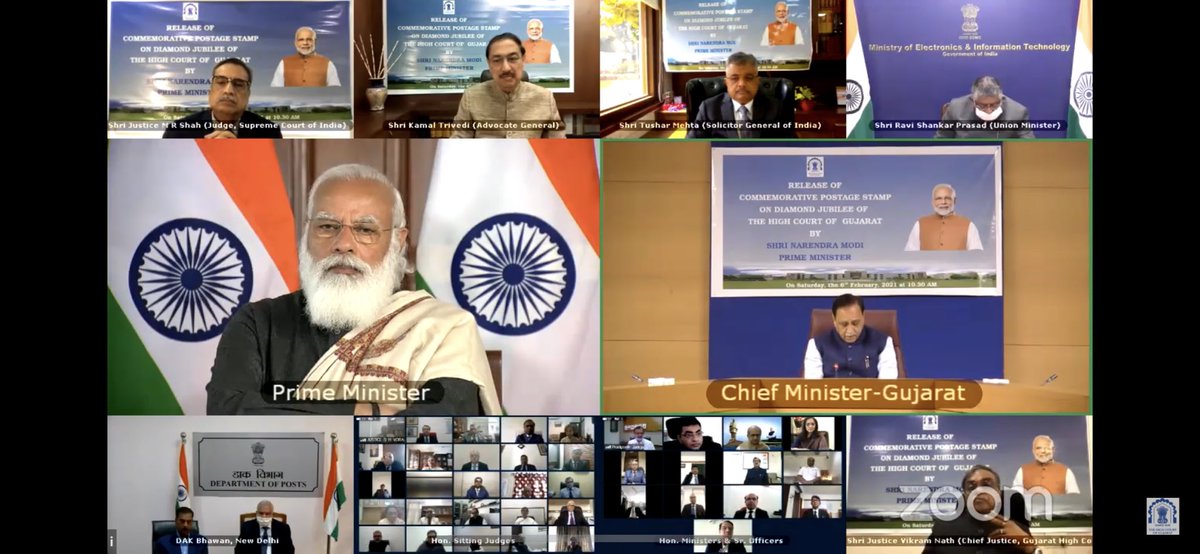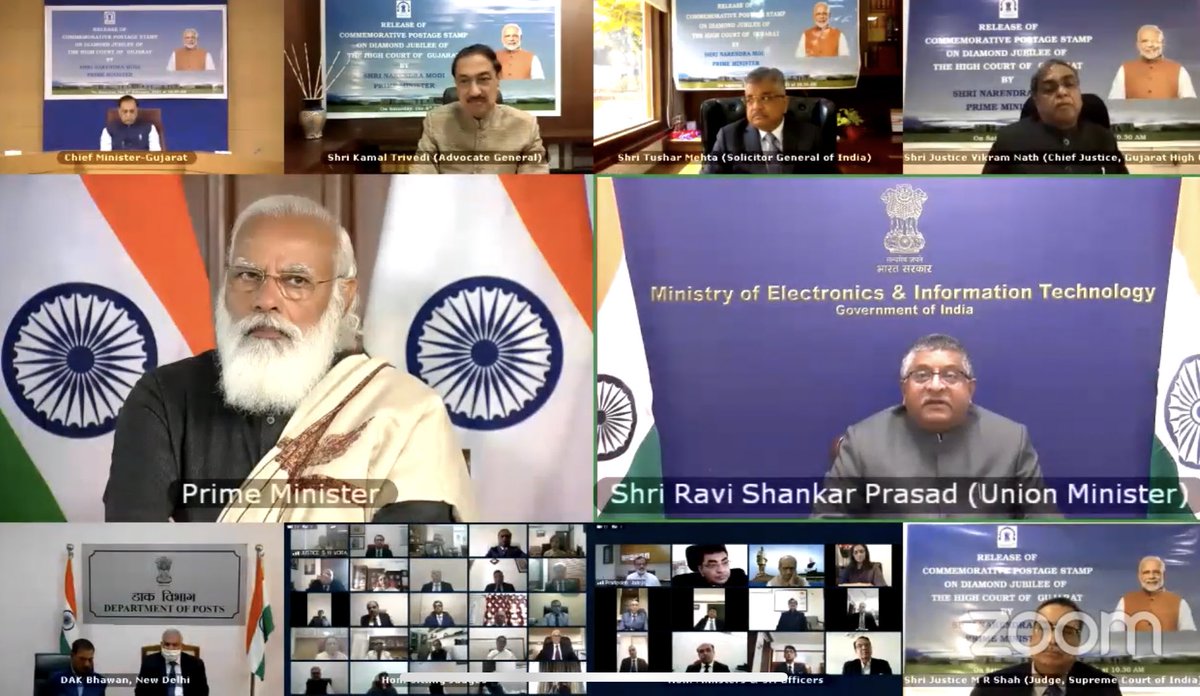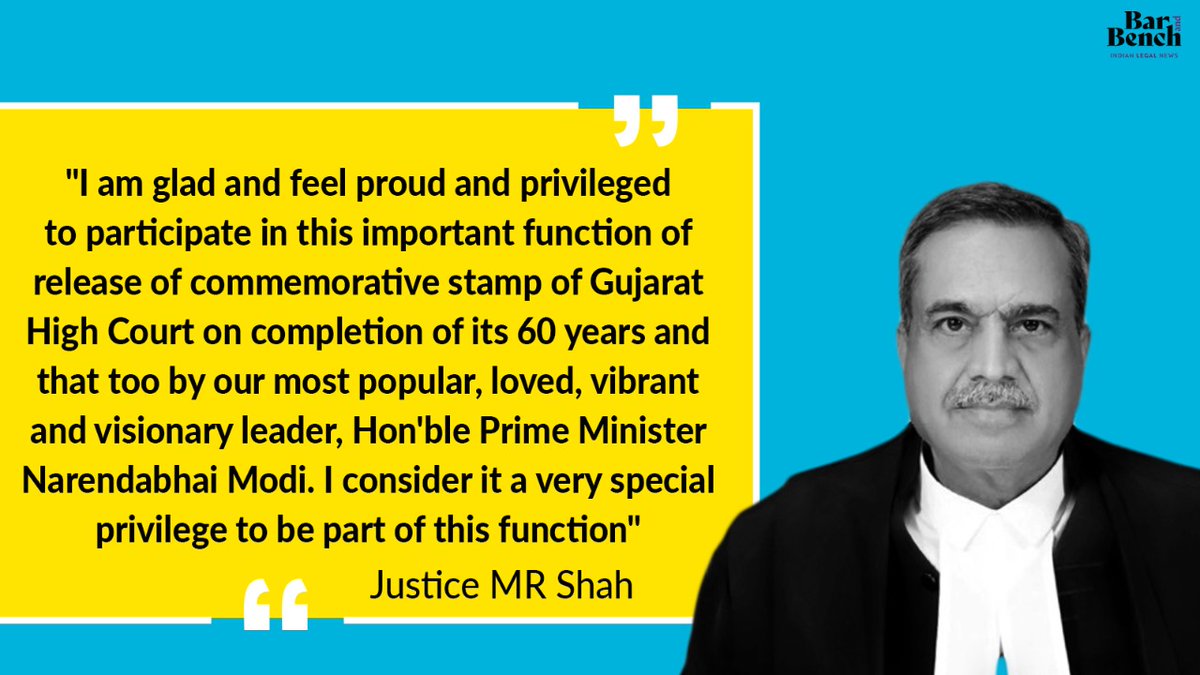
Webinar Alert: Dharmashastra National Law University, Jabalpur (DNLU), in association with the CAN Foundation to host an online lecture on "Parliament and the Judiciary on Constitutional Amendments: Shifting Paradigms"
@CANFoundation19
@CANFoundation19
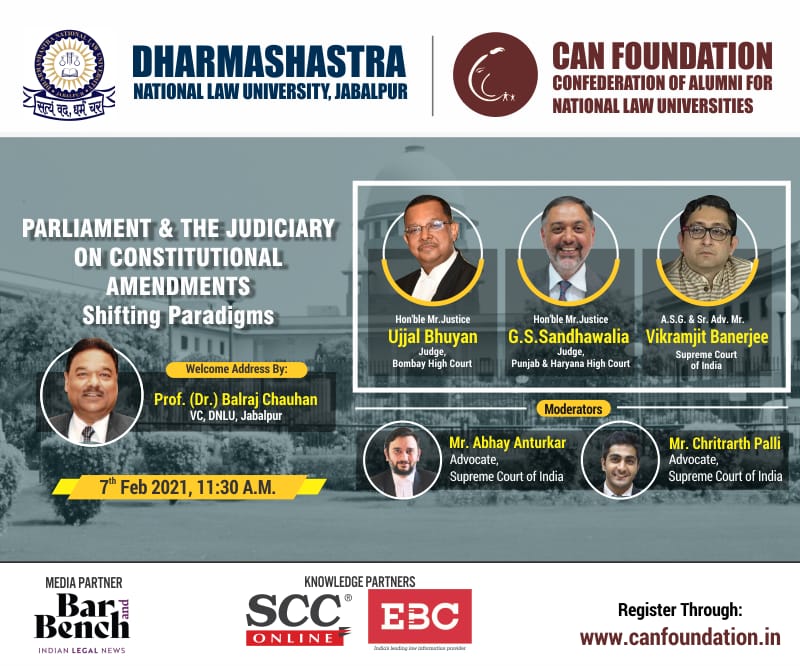
Panelists for the session will be:
Justice G.S. Sandhawalia, Judge, Punjab & Haryana High Court
Justice Ujjal Bhuyan, Judge, Bombay High Court
Vikramjit Banerjee, Senior Advocate & Additional Solicitor General, #SupremeCourt
Justice G.S. Sandhawalia, Judge, Punjab & Haryana High Court
Justice Ujjal Bhuyan, Judge, Bombay High Court
Vikramjit Banerjee, Senior Advocate & Additional Solicitor General, #SupremeCourt
Professor Balraj Chauhan, Vice Chancellor of DNLU giving the welcome address.
Session shall be moderated by Advocates Abhay Anturkar and Chritarth Palli.
Justice GS Sandhawalia of Punjab & Haryana High Court commences his address.
Parliament and State Legislatures have power to make laws under their respective fields.
Power is vested in judiciary to adjudicate on validity of such laws: GS Sandhawalia J.
@CANFoundation19
Power is vested in judiciary to adjudicate on validity of such laws: GS Sandhawalia J.
@CANFoundation19
Justice GS Sandhawalia, Judge, Punjab & Haryana High Court: India has a supremacy of a written constitution striking a balance between various pillars. If there is a violation to any provision, constitutional courts can struck them down
@CANFoundation19
@CANFoundation19
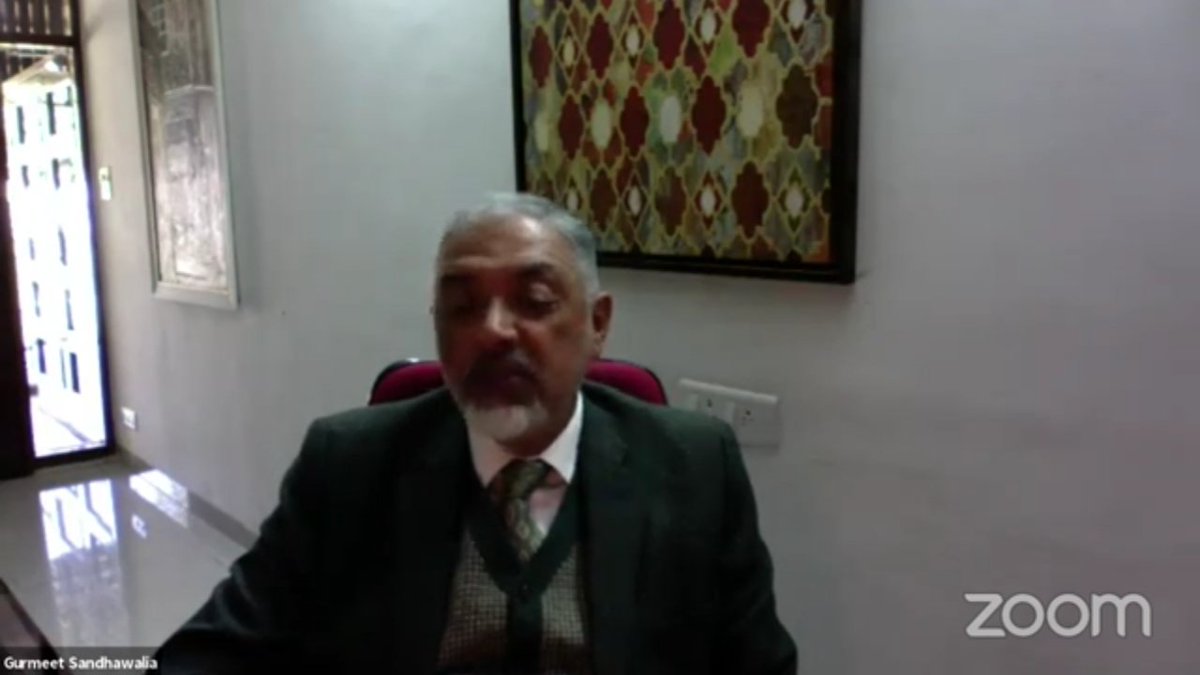
Sometimes it has been seen courts acts as brake to legislative actions: Justice Sandhawalia.
Justice Sandhawalia speak on the conflict between free press and how court news is reported.
Justice Sandhawalia refers to a note by Law Commission long back which said High Courts should not be allowed to become communal museum in the name of representation caste or community at the expense of efficiency and merit.
Sandhawalia J. referring to the challenges faced by judiciary including supersession of judges to the post of Chief Justice.
Thankfully no supersession has happened after Justice HR Khanna: Sandhawalia J.
Thankfully no supersession has happened after Justice HR Khanna: Sandhawalia J.
In the early 60s, Home Minister wanted to transfer four High Court judges.
However, CJI PB Gajendragadkar opposed it saying it will affect independence of judiciary and it never took place: Sandhawalia J.
However, CJI PB Gajendragadkar opposed it saying it will affect independence of judiciary and it never took place: Sandhawalia J.
During the emergency, 16 High Court judges were transferred. The list of 56 other judges whose names were considered for transfer was prepared to intimidate the judiciary: Sandhawalia J.
Another form of intimidation is post retirement jobs, says Sandhawalia J. referring to the case of Justice Baharul Islam
Justice Sandhawalia referring to the power of judicial review and how it stems from US Constitution
Sandhawalia says Indian Constitution and how is it is flexible.
Formal amendments to Canadian Constitution is difficult.
The unwritten Constitutional principles in Canadian Constitution is equivalent to Basic Structure doctrine expounded by Supreme Court: Sandhawalia J
Formal amendments to Canadian Constitution is difficult.
The unwritten Constitutional principles in Canadian Constitution is equivalent to Basic Structure doctrine expounded by Supreme Court: Sandhawalia J
The commonalities include rule of law, federalism, democracy, respect for minorities, judicial independence and separation of powers: Sandhawalia J.
The tussle between Parliament and judiciary can be examined by having a look at amendments and new legislations which were put in place after independence: Justice Sandhawalia.
Pandit Jawaharlal Nehru had said in Constituent Assembly that though we wanted a Constitution to be as solid and permanent as we can make it, there should be certain flexibilities. Rigidity and permanence, he said, stop the nation's growth: Sandhawalia J.
He said that what we may do today, may not be applicable tomorrow: Sandhawalia J.
Eminent lawyer Nani Palkhivala said that amending power cannot be construed as authorising the destruction of other powers and that if there is no limit to it, it can be used to destroy judicial power, executive power and legislative power: Sandhawalia J.
It was his argument that if there is unbridled amending power then Parliament could even abolish Parliament and if that were accepted then if a party believes in totalitarianism, it could establish one party rule: Sandhawalia J.
Justice Sandhawalia traces Parliamentary restrictions on judicial review and how laws were placed in 9th schedule to bar judicial review
The fact remains that founding fathers of Constitution has given us rights without placing that much importance on duties. Political players are more interested in fulfilling their individual aspirations than aspirations of people: Sandhawalia J.
The Supreme Court has shifted it's views over time but for first two decades, the view prevailed that Constitution was supreme: Justice GS Sandhawalia.
Justice Ujjal Bhuyan of Bombay High Court is the next speaker.
Justice Bhuyan tracing the Supreme Court stance on scope of amending powers of Parliament from Golak Nath to Kesavananda Bharati.
In Kesavananda judgment, the majority held that there is no implied limitation under Art. 368 on amending power. But it cannot be amended in a way that the Constitution is totally destroyed or radically changed so that it loses its identity: Justice Bhuyan.
That is Basic Structure or basic features cannot be amended and Golaknath was overruled: Justice Bhuyan.
Justice Bhuyan quoting on what the 2006 judgment of M Nagaraj said on Basic Structure doctrine.
"To destroy its identity is to abrogate the basic structure of the Constitution," it said.
"To destroy its identity is to abrogate the basic structure of the Constitution," it said.
One cannot legally use Constitution to destroy itself, Kesavananda Bharati had held: Justice Ujjal Bhuyan
Justice Bhuyan referring to article written by Senior Counsel Arvind Datar in The Hindu in 2013.
According to him, the hard work and scholarship that had gone into the preparation of this case was path breaking: Bhuyan J.
According to him, the hard work and scholarship that had gone into the preparation of this case was path breaking: Bhuyan J.
Hundreds of cases were cited and then Attorney General Niren De had made a comparative chart analysing Constitutions of 71 different countries: Bhuyan J.
All this was to answer just one question - was the power of parliament to amend the Constitution unlimited: Bhuyan J referring to the article.
One way to look at Kesavananda is that it was a victory for government and the judgment in Golak Nath was overruled. So the govt should have been happy. But they certainly were not primarily because of the Basic Structure doctrine: Justice Ujjal Bhuyan.
The Kesavananda case was the culmination of a serious conflict between the Judiciary and Executive back then: Justice Ujjal Bhuyan.
Interestingly, in all these cases, Golak Nath, Bank Nationalisation, Privy Purses and Kesavananda, Nani Palkhivala was lawyer. He was a common thread: Bhuyan J.
At that time Basic Structure doctrine was severely criticised as being anti democratic because it had put some fetters in parliament which was not intended by the Constituent Assembly: Bhuyan J.
Side by side another politico-legal development was taking place. Challenge to Indira Gandhi's election to Parliament: Bhuyan J.
Allahabad HC in 1975 declared the PM's election as void for using services of State and Central govt officials in her campaign: Bhuyan J.
Interestingly, this time Gandhi sought services of Palkhivala to plead her case.
The matter was heard by vacation bench of Justice Krishna Iyer who pronounced interim order the very next day: Bhuyan J.
The matter was heard by vacation bench of Justice Krishna Iyer who pronounced interim order the very next day: Bhuyan J.
He granted a conditional stay including that electoral disqualification stood eclipsed during the stay and PM was allowed to address the Parliament but could not vote or draw remuneration as MP. Then emergency followed: Bhuyan J.
During this period several amendments were introduced including 39th amendment as per which elections of PM, speaker of Lok Sabha, President, Vice President were made immune from judicial scrutiny: Bhuyan J.
In case of a dispute, those could be decided only by an authority to be established by Parliament: Bhuyan J.
These amendments were also challenged and clubbed together with the election petition and heard by SC: Bhuyan J.
Those amendment were then struck down for violation of Basic Structure in 1975 in Indira Gandhi v. Raj Narain: Bhuyan J.
This judgment was a unanimous one rendered by five judges four of whom had given the minority opinion in Kesavananda. There they had said that Parliament had untrammeled powers. Here they followed Kesavananda to strike down amendments for violation of Basic Structure: Bhuyan J.
This judgment was a fine example of judicial discipline: Bhuyan J.
Three days after this, CJI AN Ray convened a 13-judge bench to review the Basic Structure doctrine: Bhuyan J.
There was no application for such review and no hearing had taken place on which such an order constituting the bench was passed: Bhuyan J.
When hearing commenced, there was palpable tension in the court room. Palkhivala appeared to oppose the review citing there was no case before the court in which such an order was passed: Bhuyan J.
Justice Khanna wrote in his memoirs that the height of eloquence that Palkhivala reached that day will never be surpassed in the history of the Supreme Court.
The next day, the CJI dissolved the Bench: Bhuyan J.
The next day, the CJI dissolved the Bench: Bhuyan J.
Next speaker is Additional Solicitor General, Vikramjit Banerjee.
If look at Constitutionalism as such, we see two basic models. One is the British model and the other is Roman Model: Banerjee.
Roman Model is extremely old. It has always believed in democracy, checks and balances on powers, very defined rights of institutions and people: Banerjee.
The only non-Roman influenced democracy or democratic Constitutional system which arose in western Europe was the British system: Banerjee.
If you go through British Constitutional history, they say it comes from what is called Gothic bequest: Banerjee.
Posited against this is what they call the 'Norman Yoke'. Gothic bequest would have the Anglo Saxon conception of democracy and Norman Yoke is what they consider as having come from Norman's who came from Europe and conquered Britain: Banerjee
There was this continuous move against Norman Yoke. So the conception of a written Constitution, power concentration, strict division of powers, there was reluctance to adopt it: Banerjee
It was repeated again and again that we (British) are different and we have our own method of doing things: Banerjee
This brings us to US system. US broke away from UK in 1700s and it brought in large amounts of Roman conceptions of governance. Even today, the President, enjoys very wide powers influenced by Roman powers of the Consul: Banerjee
When American Constitution was originally framed, fundamental rights was not part of it but then it was amended and fundamental rights were brought in: Banerjee
As famously said during American independence and repeated later was the skepticism towards Common Law and common law conceptions of Constitution: Banerjee.
Another great hallmark of American style of Constitution is introducing amendments are extremely difficult.
For them, it is the Constitution which creates the country, it is fundamental document which creates the country and basis of social contract: Banerjee
For them, it is the Constitution which creates the country, it is fundamental document which creates the country and basis of social contract: Banerjee
I think that is extremely different from the way British Constitutionalism approaches Constitution: Banerjee
In UK, there is no strict separation of powers. For eg. Lord Chancellor was at one point of time, the head of British judiciary. He was also the Law minister of the govt: Banerjee
House of Lords (Law Lords) had a judicial body which existed and worked within the framework of Legislature: Banerjee
Fundamental rights was brought into the British Constitutional system through the Human Rights Act: Banerjee
I would think that British Constitutional law did not feel that there was an importance to Fundamental rights. The reason is that it used equity and high prerogative writs to ensure the common person was protected: Banerjee
Coming back to our Constitution, it is a halfway house. Great example is Article 32 which gives fundamental right to approach the Supreme Court where it mixes with the conception of high prerogative writs which has its origin in British system: Banerjee.
You can use either of these two to ensure protection of rights of people: Banerjee.
The reluctance of Supreme Court for first 20 years to interfere with powers of Parliament was because people interpreted the Constitution as a Constitution of British model: Banerjee.
Under the British model, the Constitution would be a very important Act, no doubt. But it would be one in a series of acts which govern the State. And there would be other Acts besides the Constitution which would be part of the entire process of Constitutional law: Banerjee
It would not assume that the State is a creation of the Constitution. It would treat the Constitution as a path controlling mechanism of the powers of the State: Banerjee.
In Indian history, the Government of India Act1935 is in many ways the basis of power sharing arrangement which is underlying the Indian Constitution in a major way: Banerjee.
British Constitutional law has always historically stressed that there should be an amount of input from executive in appointment of judges: Banerjee
It has not stopped the judges from being fair and deciding against govt. Even today, in India, some of the most path breaking judgments against govt which has stood out, including during emergency was by judges who were appointed by Executive: Banerjee.
It would therefore be incorrect to say merely because executive has a role, it would put our Constitution in danger: Banerjee
Session concludes.
• • •
Missing some Tweet in this thread? You can try to
force a refresh

